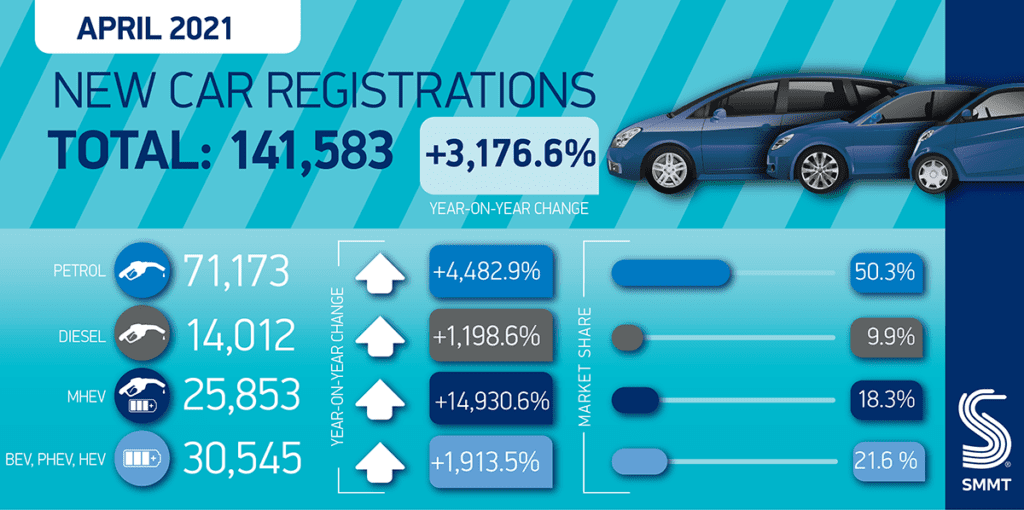New car registrations increased by 3,176.6% in April as dealerships finally reopened to the public.
While this figure may sound astounding, it should be remembered that in the midst of the UK’s first COVID-19 lockdown, only 4,321 cars were sold in April 2020, compared to 141,583 last month. In fact, the figures are down 12.9% on 2019, the last year of non-COVID impacted sales.
Volumes also remained 12.9% lower than the 10-year average, the Society of Motor Manufacturers and Traders (SMMT) announced. Overall registrations for 2021 now stand at 567,108 units, 32.5% down on the average recorded over the past decade.

Private demand saw the most significant recovery, rising from just 871 registrations last April to 61,935. Click and collect supported the market for the first week and a half until dealerships could reopen on 12 April – a marked contrast from the same month last year, where COVID restrictions effectively prevented private purchases.
Overall registrations for 2021 now stand at 567,108 units, 32.5% down on the average recorded over the past decade. However, the full impact of showrooms reopening has yet to be realised, given the delay between a customer initially visiting a dealership, deciding on a model and then taking delivery of that new vehicle is normally a number of weeks.
Fuel types
Petrol remained the most popular choice, taking 50.3% of the market. However the decline of diesel continues, with its share dropping under 10% in the month (9.9%). Battery electric vehicles (BEVs) increased sales by 566.1%, with 9,152 registrations, while plug-in hybrids (PHEVs) saw growth of 10,005% – although this only equates to 9,600 sales compared to 95 last year.
Registrations and growth of electrically chargeable vehicles (EVs) will be difficult to read in the next few months. The best measure of market comparison during the industry’s recovery phase is 2019. However, since then, the number of EV models coming to market has increased, along with the country’s charging infrastructure. This makes EVs more appealing to a greater number of people.
The SMMT states that BEVs are now expected to account for 8.9% of registrations by year-end, down from the 9.3% initially forecast in January, in light of March’s changes to the Plug-in Car Grant. With PHEVs anticipated to take a 6.3% market share, total plug-in vehicles should comprise 15.2% of all cars registered in 2021.
Improving forecasts
In light of the more upbeat economic outlook on the back of vaccine rollout and easing of lockdown restrictions in line with government roadmap, SMMT has revised its forecasts of total registrations upwards from 1.83 million to around 1.86 million new cars by the end of the year, a 13.9% increase on 2020.
However, this would still be 20.2% down on the average of 2.33 million registrations a year recorded between 2010 and 2019. Demand is likely to be driven by a broad range of new models and powertrains, with confidence bolstered by the gradual reopening of the country.
“After one of the darkest years in automotive history, there is light at the end of the tunnel, commented Mike Hawes, SMMT chief executive. “A full recovery for the sector is still some way off, but with showrooms open and consumers able to test drive the latest, cleanest models, the industry can begin to rebuild.
“Market confidence is improving, and we now expect to finish the year in a slightly better position than anticipated in February, largely thanks to the more upbeat business and consumer confidence created by the successful vaccine rollout. That confidence should also translate into another record year for electric vehicles, which will likely account for more than one in seven new car registrations.”




You must be logged in to post a comment.